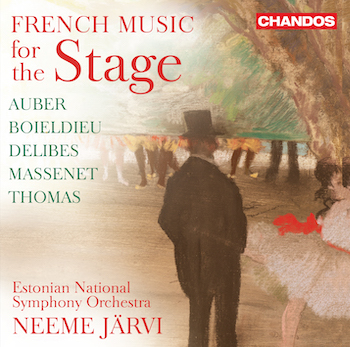Classical Album Review: “French Music for the Stage”
By Jonathan Blumhofer
There’s much to enjoy here and admire, both in the performances and the selections on hand, which hardly dwell on the usual suspects or limit themselves too narrowly.

Conductor Neeme Järvi’s recent enthusiasm for (mostly) 19th-century French theater music continues with a new release called French Music for the Stage. Like last year’s inimitable survey of ballet suites by Léo Delibes, the new disc features the Estonian National Symphony Orchestra (ENSO) and suggests that the now-83-year-old maestro’s expansive musical interests aren’t waning.
To be sure, French Music’s selections hardly dwell on the usual suspects or limit themselves too narrowly.
Indeed, Järvi’s program covers an admirably expansive chronological range, starting with François-Adrien Boieldieu’s Overture to Le calife de Bagdad (from 1800) and ending with Jules Massenet’s 1907 ballet Espada. In between come overtures by Ambroise Thomas and Daniel-François Auber, plus Delibes’s 1882 dances for incidental music to Victor Hugo’s play, Le roi s’amuse.
The most substantial piece here is the Massenet, which echoes Bizet’s Carmen in more ways than one (the plot, for instance, involves a girl who has an affair with a matador). Accordingly, there’s much Spanish-sounding fun to be had: a lusty “Madrilena,” jaunty “Marche de Toreadors,” and a fresh, unaffected “Fandango,” among them.
Järvi draws playing of real color and heat from his forces. They capture the score’s subtle turns of harmony (like the unsettling twists before the end of the “Fandango”) as well as Massenet’s fresh, graceful lyricism (the “Scène de l’Espada” dances as naturally as one might want) with aplomb.

Conductor Neeme Järvi. Photo: Wiki Common.
Delibes’s faux-Renaissance dances for Le roi s’amuse aren’t among his strongest creations: there’s a certain formal stiffness and want of variety between them. Even so, there’s much to admire in the ENSO’s performance of these movements. The woodwind playing in the “Galliard” and “Pavane” is superb. Also, Järvi & Co. bring rhythmic verve and style to the proceedings, as well as moments of discretion (the “Vieille Chanson,” with its delicate mandolin textures, comes over beautifully).
The overtures — several of which, ages ago, were staples — want nothing for freshness or invention. Or, for that matter, performances: the ESNO is perfectly at home in them.
Le calife de Bagdad, with its evocations of Turkish Janissary music, is thrillingly done. So is Boieldieu’s La dame blanche, which manages, in its eight minutes, to subtly echo Beethoven and Rossini while also anticipating Arthur Sullivan and, perhaps, Richard Wagner — it needs to be heard to be believed.
Meanwhile, Auber’s Fra Diavolo builds to a rousing coda and the Overture to Thomas’s Raymond is well-shaped and amiable.
In all, there’s much to enjoy here and admire, both in the performances and the selections on hand.
Jonathan Blumhofer is a composer and violist who has been active in the greater Boston area since 2004. His music has received numerous awards and been performed by various ensembles, including the American Composers Orchestra, Kiev Philharmonic, Camerata Chicago, Xanthos Ensemble, and Juventas New Music Group. Since receiving his doctorate from Boston University in 2010, Jon has taught at Clark University, Worcester Polytechnic Institute, and online for the University of Phoenix, in addition to writing music criticism for the Worcester Telegram & Gazette.
Tagged: Chandos, Estonian National Symphony Orchestra, French Music for the Stage
